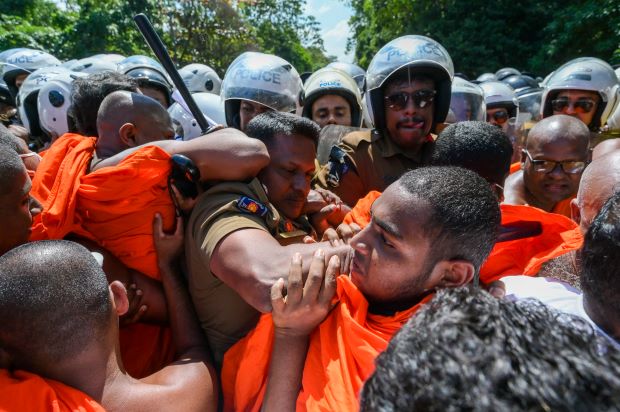Opposition mum as monks burn India-backed constitutional amendment

By Himal Kotelawala
COLOMBO – As sections of Sri Lanka’s Buddhist clergy took to the streets against a proposed full implementation of an India-backed constitutional amendment to resolve Sri Lanka’s ethnic issue, the country’s opposition parties remained mum on the protests and on their own stance on devolution.
Opposition National People’s Power (NPP) leader Anura Kumara Dissanayake, when asked by a journalist about the monks’ protest on Wednesday (8), claimed that President Ranil Wickremesinghe had set a trap.
“I ask the people of this country to not get caught in this trap. What Wickremesinghe wants is to brush the real problems aside and bring out other problems to create a disturbance in society,” Dissanayake charged.
The NPP leader said President Wickremesinghe will not fully implement the 13th Amendment to the Constitution as repeatedly assured by him.
“He won’t bring it. He plays this game every time. He wants to set fire to this country and protect his power,” he said.
Dissanayake did not elaborate on his party’s position on the 13th Amendment.
A group of Buddhist monks staged a protest against the Amendment near the Parliament complex Wednesday morning as President Wickremesinghe told MPs that he is committed to devolving power within a unitary state as a permanent solution to the island nation’s decades-long ethnic issue.
Tensions rose at the protest as police tried to block the monks who dispersed only after an official from the presidential secretariat spoke to them and assured a response from the president.
Some of the monks set fire to a copy of the 13th Amendment in full view of the media and police personnel in a scene that was eerily reminiscent of Wickremesinghe’s United National Party (UNP) burning a draft bill of a new constitution presented to Parliament by former President Chandrika Bandaranaike Kumaratunga’s government in 2000, also a solution to the conflict.
Meanwhile Sri Lanka’s main opposition the Samagi Jana Balawegaya (SJB) has yet to make its views known on the rising opposition to the 13th Amendment from nationalist quarters.
A small number of MPs on both sides of the aisle have expressed their opposition, but the president has said he will go ahead with full implementation.
The SJB boycotted a recent All-Party Conference (APC) on the ethnic issue but said it supports devolution of power, though the party has yet to articulate its position on the amendment’s full implementation.
Wickremesinghe told Parliament on Wednesday that there will be no division of the country, contrary to fears expressed by some Buddhist monks.
The 13th Amendment to Sri Lanka’s Constitution emerged from the controversial Indo-Lanka Accord of 1987 as a purported solution to the worsening ethnic conflict, four years after war broke out. Provincial Councils came in the wake of this amendment, though land and police powers have yet to be devolved to the provinces as originally envisioned. Both Sinhalese and Tamil nationalists have historically opposed the amendment, the former claiming it devolved too much, the latter complaining it didn’t devolve enough.
A full implementation of the Amendment would see land and police powers devolved to the Provinces, a development that is not likely to garner support from Sri Lanka’s more nationalist-oriented parties including sections of the ruling Sri Lanka Podujana Peramuna (SLPP).
Meanwhile, India has expressed its support for Wickremesinghe’s assurances that the Amendment will be fully implemented. India’s support is crucial to the cash-strapped island nation as it struggles to recover from its worst currency crisis in decades. India has officially communicated to the International Monetary Fund (IMF) that it will support Sri Lakna’s debt restructuring process, which is a prerequisite for a desperately needed 2.9 billion dollar IMF bailout.
The leftist Janatha Vimukthi Peramuna (JVP), which controls the NPP, staged a violent insurrection in the late 1980s in opposition to the Indo-Lanka Accord. Former President Ranasinghe Premadasa also opposed the accord signed by his predecessor President J R Jayawardena.
Meanwhile, Jaffna district MP and former Northern Province Chief Minister C. V. Vigenswaran on Wednesday welcomed the president’s decision, while noting however that the 13th amendment falls short of the aspirations of the Tamil people.
-economynext.com


Comments are closed, but trackbacks and pingbacks are open.